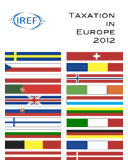Among the many ways to understand the climate of opinion and the culture of a country, looking at its fiscal system is one of the most rewarding. Of course, tax systems almost always rhyme with complexity, each system bearing the weight of its history. But the attempts to change the system and give it a new direction are highly instructive. To observe changes, debates and new directions in tax systems is precisely what the IREF Yearbook is all about. In that sense the Yearbook is not in direct competition with other annual reports on taxation that typically focus on numbers rather than on the philosophy behind them.
Another unique trait of this Yearbook is to provide the latest information on the topic. What is presented here are the last known figures (this year the date relate to 2010) and current debates. This approach allows the reader to judge whether public decision-makers have been keeping their promises or have been victims of inter-temporal inconsistencies, conceiving plans that they are later unable or unwilling to maintain. The Yearbook is designed for all those who look for a dynamic understanding of tax and budgetary policies. This includes scholars and students, but also journalists, entrepreneurs, business people and public policy makers. While avoiding technical jargon, authors do not hesitate to enter the details of a mechanism whenever it is necessary. For we all know that there is sometimes a world between notional and real taxation. These reports can be used all along the year for quick reference whenever mention is made of one of the 20 countries presented here. The country profile cards should further facilitate such use of the Yearbook.Home » IREF Yearbook on Taxation in Europe 2012



